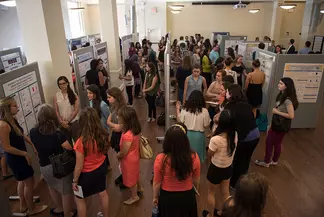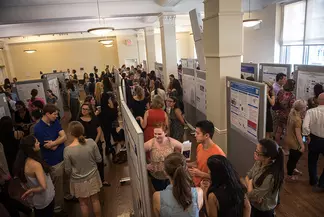
Pathways to Institutional Change
Although the natural sciences have always been a particular strength of Barnard College, the nearly quarter-century of continuous support from the Howard Hughes Medical Institute (HHMI) has allowed the faculty to solidify its offerings and broaden both the range of science offered to students and the pedagogical approaches that faculty employ. Supported by six consecutive HHMI awards (1991, 1996, 2000, 2004, 2008, and 2012), the Hughes Science Pipeline Project (HSPP) was conceptualized as a cohesive program of interrelated strategies that serve a singular objective: to increase the number of students, especially women and underrepresented minorities, who pursue graduate degrees and careers in the natural sciences and medicine. The HSPP's interlocking programs were initially organized around four overlapping components identified by HHMI in the early 1990s: student development, faculty development, curriculum development, and outreach. A committee of science department chairs and administrators has overseen the development and implementation of new programs in the HSPP with each new funding cycle. The HSPP has evolved organically over time as faculty and administrators have identified new needs and opportunities related to science education.

Apprenticeship-based research experiences had been available to Barnard students for many years before the college received its first award from HHMI in 1991. However, support for these student development efforts was limited by the availability of funds from outside sources. The first HHMI award represented a core funding source that enabled students from five science departments to engage in year-long research projects. The extended research experience quickly became an integral part of Barnard's science research culture, and formal assessments have demonstrated the extraordinary success and utility of these experiences. In 2014, with the ongoing support of HHMI, other funding institutions, and individual donors, Barnard established the Summer Research Institute (SRI), which now offers summer research experiences in science to more than one hundred students (approximately eight times as many students as the HHMI Research Internship program was able to support). The internships carry a generous summer stipend, and the college provides in-kind housing. The SRI culminates with a luncheon and poster session each summer. Many participants continue their research during the following academic year, often as the basis of a senior thesis. The college is now building a dedicated endowment to institutionalize and support the SRI. The establishment of the SRI is an example of institutional change that required discussion and "buy-in" at different levels within Barnard. For example, implementing the SRI required in-depth conversations within and across departments as well as the offices that provide services to the many students who are in residence for the summer. A steering committee, which includes representatives from all science departments as well as staff from the Dean of Studies and Provost's Offices, who provide substantial administrative and logistical support.

Faculty development initiatives have changed with each award in response to perceived needs in the various science departments. The first award included funding for one new member of the biology department, and the two courses she developed—Women's Health and Biostatistics—are still offered, though in modified form. Subsequent faculty development initiatives provided funds for technical experts to develop lab manuals for specific equipment or approaches. In biology, this effort resulted in the adoption of SPSS as the preferred tool for data handling and analysis in laboratory courses. In chemistry, it provided student user manuals for the department's NMR spectrophotometer.
The HSPP's curriculum development initiatives also changed with each HHMI award in direct response to new developments in science. Biology started with curricular initiatives focused on epidemiology and public health, and then shifted its focus to neuroscience, which is co-sponsored by the psychology department. From there, biology developed standardized methods and programs for data handling and statistical analysis across its laboratory curriculum, an effort that helps to prime students for engaged and meaningful research experiences. Most recently, biology faculty developed the Manduca Functional Genomics Curriculum. These efforts have established a habit of innovative curricular change. Most of the new courses and programs initiated by the HSPP have been institutionalized and continue to be available to students. Moreover, plans for a new building, for which construction has just begun, include a scientific computing laboratory where many of the intellectual threads explored and developed with HHMI support will be woven together with computational science.
Over the past twenty-five years, Barnard's science faculty have also employed more active learning strategies in their courses, using in-class response systems and problem-based homework assignments in the larger classes. HHMI support also allowed the development of a Supplemental Instruction (SI) program for introductory biology, in which peer-led activities focus on the best strategies for learning science. The SI program is especially helpful to students from groups that are traditionally underrepresented in the sciences and those who arrive at college from under-resourced high schools. For several years after its initial implementation, SI was supported with funds from the Altman Foundation. A modified format of SI is still offered with support from operating funds.
Recently, the biology department has increased its emphasis on authentic student research undertaken in laboratory classes and in apprenticeship-based research experiences. In addition to the Manduca functional genomics curriculum, all biology laboratory courses include either an individual or group research component, and two faculty have designed a year-long, project-based lab course in genetics and molecular biology that will debut in the 2016–2017 academic year. Biology and chemistry faculty have also developed new seminars that prepare first-year and sophomore students to conduct original research with faculty mentors. The Biology Journal Club introduces first-year students enrolled in the introductory courses to the scientific literature with discussions of papers that have just been published. In the Research Apprenticeship seminar, first-year students are introduced to research through interactions with research interns and faculty who may later serve as their research mentors. Finally, the Research Methods Seminar (co-taught by biology and chemistry faculty) introduces sophomores to important topics (e.g., searching the literature, preparing proposals for research, laboratory safety, ethics in science) in the semester before many of them first engage in individual research.
Support from HHMI has also strengthened the college's outreach efforts. The Science in the City Seminars and a Math in the City Seminar provide professional development opportunities for pre-service and in-service elementary and middle school teachers. In addition, the Intercollegiate Partnership, a collaborative project between Barnard and LaGuardia Community College (CUNY), provides a residential college experience to sixteen community college students each summer, introducing them to the rigors of academic life at a four-year college as they are about to embark on the next stage of their academic careers.
With the encouragement of HHMI, the faculty has embraced the value of assessment for making evidence-based changes in the curriculum and programming. All Barnard courses are now assessed with narrative and quantitative student evaluations, and the performance of different groups of students in science courses and majors are assessed institution-wide. These efforts will enable the creation of programs targeted to particular groups of students with the goal of allowing all students to achieve excellence in science.